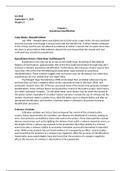5.1 Institutions and power
Institutions are written and unwritten rules that govern:
- What people do when they interact in a joint project
- The distribution of the products of their joint effort
Economic interactions are governed by institutions, which specify the rules of the game
Dictator Game: Proposer has all the bargaining power, and the responder has none.
Allocation: Outcome of an economic interaction.
5.2 The Pareto Criterion
A Pareto dominates B if at least one party would be better off with A than B, and nobody
worse off.
I, I dominates T,T
Pareto Efficiency: An
allocation that is not
pareto dominated by
another allocation.
There is no
alternative allocation
in which at least one
party would be better off and nobody worse off.
Example: In the ultimatum game an allocation of one cent to the Responder and R99.99 to
the Proposer is also Pareto efficient, because there is no way to make the Responder better
off without making the Proposer worse off. Pareto Efficiency is not always fair.
Pareto Criterion does not tell us which of the Pareto Efficient allocations are better. A pareto
efficient outcome is not always better than an inefficient one. It is possible for participants to
be worse off in pareto-efficient outcome.
, ECONOMIC NOTES
5.3 Fairness
We can determine objectively whether an outcome is Pareto efficient or not. But whether
the outcome is fair depends on your own analysis of the problem, using the concepts of
substantive and procedural fairness.
Substantive judgements of fairness:
- Based on the allocation itself.
- Based on inequality in terms of income, happiness, or freedom.
Procedural judgements of fairness:
- Based on the rules of the game and the allocation itself.
- The rules of the game that brought about the allocation may be evaluated according
to
~ Voluntary exchange of private property acquired by legitimate means: Were
the actions resulting in the allocation the result of freely chosen actions?
~ Equal opportunity for economic advantage: Were there equal opportunities
to acquire a large share or were they subjected to discrimination or
disadvantage?
~ Deservingness: Did the rules consider working hard and other social norms in
determining the allocation?
A fair game includes randomly chosen proposers, game played anonymously, no
discrimination and only voluntary actions.
Use the veil of ignorance to not know what position we held in a game and make a
judgement from there.
5.4 Choice and Conflict
MRT of free time into grain: The trade-off she is constrained to make.
MRS (Indifference curves): The trade-off between grain and free time that she is willing to
make.
Scenario 1: Angela works the land on her own
The steeper the indifference curve, the more Angela values free time relative to grain. The
more free time she has (moving to the right), the flatter the curve gets.
Quasi-linearity: MRS is constant at a given amount of free time for each indifference curve.
(e.g. 6 hours)




